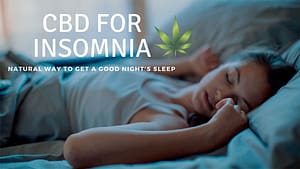
Did you know that CBD can help reduce Anxiety, Depression, Inflammation and reduce Insomnia? Each night, millions of individuals in the United States have difficulty falling asleep or staying asleep. While for some this is a temporary problem, for others insomnia can become a chronic issue that detrimentally affects day-to-day life. Chronic insomnia can have a negative impact on your health, increasing your risk of depression and high blood pressure. It also can lower your quality of life. To get your own natural medicine you will need some prescriptions and a mo marijuana card.
Restful, nourishing sleep is not only essential to getting things done and performing at one’s best, it also supports optimal functioning of the immune system, mood stability, improved energy and motivation levels, and enhanced overall well-being.People have been turning to cannabis for its possible health benefits for many years. Its ability to help people is mentioned in the “Atharvaveda”, a Hindu text that dates back to 1500 B.C., and its use for inducing sleep is described in a 1200 A.D. Chinese medical text.
Today, people are still using cannabis to help them sleep, particularly CBD, or cannabidiol, which has shown great results in treating pain, inflammation and anxiety, some of the causes of Insomnia. It’s easy to understand why people are turning to CBD to help with sleep: Almost 80 percent of Americans say they have trouble sleeping at least once a week. In a study in the January issue of The Permanente Journal, published by the Kaiser-Permanente health insurance company, Colorado researchers looked at the health records of 72 patients who were treated with CBD for either anxiety or poor sleep, in which case you might want to like filling this empty 510 vape cartridges with prescribed CBD extracts. During the three-month study, anxiety levels did decline, even in people whose main complaint was poor sleep: 47 experienced anxiety and 25 experienced poor sleep. Each of the subjects were given 25 milligrams (mg) of CBD in capsule form each day. In the first month, 79.2 percent of the patients reported lower anxiety levels and 66.7 percent reported better sleep.In a recent nationally representative Consumer Reports survey, about 10 percent of Americans who reported trying CBD said they used it to help them sleep – a majority said it worked.
Scientists have some biological explanations for how CBD may affect both sleep and anxiety. Recent studies have shown that Cannabinoids (CBD) compounds interact with receptors throughout the body—the so-called endocannabinoid system—including the brain. At least one of those type of receptors is thought to affect the body’s sleep/wake cycle, offering one explanation for how CBD could affect sleep directly. Scientists found CBD also interacts with another receptor in the brain linked to anxiety. In the study, “The Human Endocannabinoid System Meets the Inflammatory Cytokine Cascade” by Dennis Hill “Let us look more closely at the two primary therapeutic cannabinoids, THC and CBD. The National Institutes of Health tell us that THC is the best known because of its signature psycho- tropic effect. This government report shows THC to be effective as an anti-cancer treatment, an appetite stimulant, analgesic, antiemetic, anxiolytic, and sedative.
CBD (cannabidiol) is a metabolic sibling of THC, in that they are alike in many ways but are also different in important properties. First we see that CBD has no psychotropic effects and there are few CB2 receptors in the brain and peripheral nerves. There appears to be a broader therapeutic profile associated with CBD, which includes, just to name a few: reduction of seizures in epilepsy; anti-nausea and appetite improvement; insulin sensitivity; improvement of sleep; pain relief; and inti-inflamatory.
Now let’s consider the delivery system:
Vaping CBD might work faster, because vaping quickly gets the compound into your system, says Earleywine, who is also the author of “Understanding Marijuana” (Oxford University Press, 2005). But pills, oils, gel caps, and gummy bears might help you sleep longer, because they release the CBD more slowly into your system. If you opt for one of those forms, Earlywine suggests taking it about an hour before bedtime.
If you are having problems with anxiety and/or sleep, I recommend trying the gel caps. These work for me. I take a 15 mg. Gel Cap in the late morning, then another 1 hr. before bedtime.
But, where do you find the best product. The answer to this question can be troublesome, because there are so many CBD companies jumping into the ballgame. However, the simple answer is: buy from a reputable company that doesn’t take advantage of the “hot” market and charges an arm and a leg. You also may wish to buy from a company that supports a cause, or a mission, that you agree with.
We recommend MASH Hemp because their products are low cost, derived from “home grown” organic fields and use CO2 Extraction – the cleanest method, and they have a specific mission – helping lower the suicide rate of Veterans and 1st Responders through the purchase of their products. You can visit them at: www.mashhemp.com
Please reply if you have any questions, or wish to add to our studies.
Thank You, Sherm
